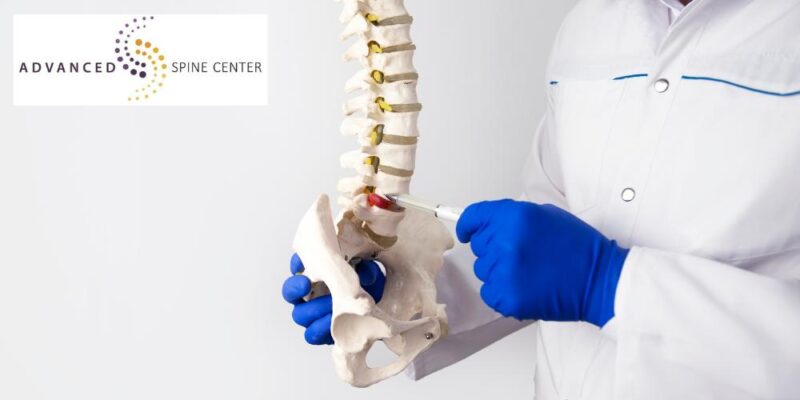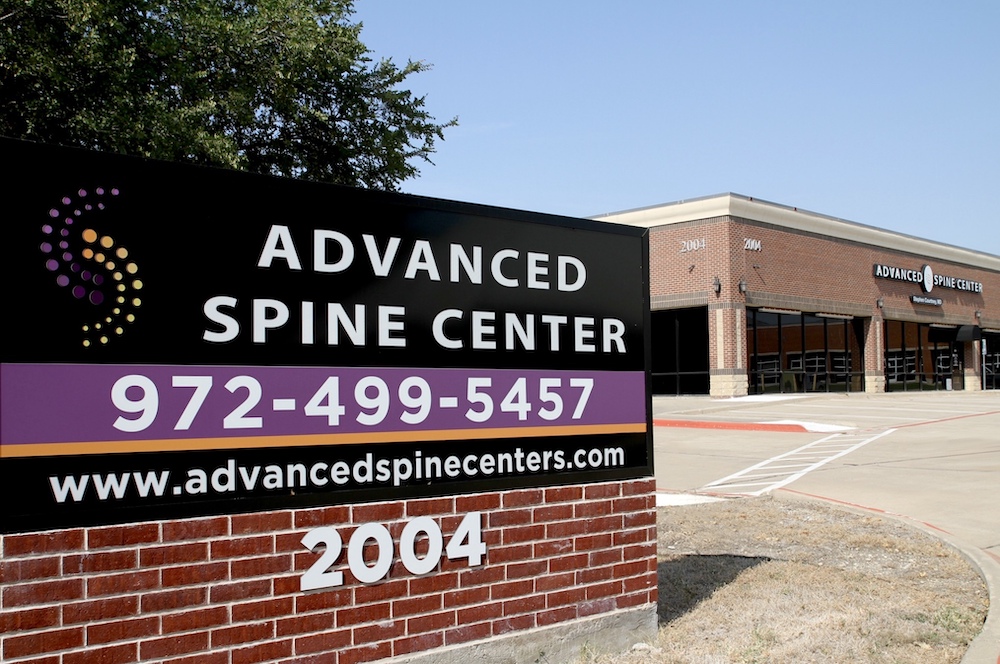Specialties
Lumbar Revision Doctor in Plano
While most initial back surgeries are successful, approximately 3% of lumbar surgeries require revision. At Advanced Spine Center, spinal orthopedic surgeon Stephen Courtney, MD, offers lumbar revision surgery to correct problems with hardware, support bone fusion for stability, and address new complaints after the initial surgery.
Based in Plano, Texas, for more than 20 years, Dr. Courtney has the experience and technical skills needed to perform detailed lumbar revisions. Find out how a lumbar revision can help you by calling 972-499-5457 or booking a consultation online today.
What Is Lumbar Revision Surgery?

Lumbar revision surgery is a surgical procedure performed on the lumbar region of the spine to correct or modify a previous spine surgery. This type of surgery is typically necessary when a prior spinal surgery has not achieved the desired outcome or has resulted in complications, such as pain, instability, or hardware failure. Revision spinal surgery aims to address these issues and improve the patient’s spinal condition.
When Is Lumbar Revision Recommended?
Spine surgery is an effective option for certain conditions, including spinal stenosis, chronic back pain, and radiating leg pain. Many patients undergo spine surgery after conservative treatments like pain management, physical therapy, and lumbar spinal injections have not provided adequate pain relief. Unfortunately, any complications that occur during the first spine surgery could necessitate a revision spine surgery.
There are various reasons why a person may require lumbar revision surgery. Lumbar revision — a second back surgery — could be recommended if you experience any of the following conditions after your initial back surgery.
- Recurrent disc herniation
- Pseudoarthrosis (lack of bone fusion)
- Adjacent segment disease (ASD)
- Failure of a total disc replacement (TDR)
- Hardware problems
- Failed back surgery syndrome (FBSS)
- Postoperative infections
- Excessive scar tissue
- Spinal instability
Dr. Courtney understands the stress of a second surgery and takes all the necessary precautions to ensure you receive the best care possible. He also ensures that you have thorough rehabilitation afterward to support your recovery.
How Common Is Lumbar Revision Surgery?
Complications in spinal surgery are rare, but it is always important for patients to understand the potential risks before undergoing surgery. Most patients who have spine surgery see significantly improved symptoms, and very few need revision surgeries.
The percentage of patients who need further surgery depends on a few factors, including the severity of their condition, the surgery location, the type of surgery, and more. Generally, the percentage of patients needing revision spine surgery ranges from 2-9%.
Types of Lumbar Revision Spine Surgery
Multiple types of procedures can repair and revise a prior surgery. Examples of these procedures include lumbar spinal fusion, laminotomy, facet thermal ablation, foraminotomy, and microdiscectomy. We outline the differences between each below.
- Lumbar spinal fusion: Fusion involves joining two or more vertebrae together using bone grafts, screws, rods, or other hardware. Revision fusion surgery may be required to enhance the fusion or address complications, such as non-union (failure of the bones to fuse) or hardware-related issues.
- Laminotomy: In some cases, patients may have undergone a laminotomy (removal of the lamina) as part of the initial surgery. Revision surgery may involve reversing this procedure to restore stability or address complications.
- Facet thermal ablation: This procedure involves cleaning the facet joint and deadening the spinal nerves causing pain with a laser.
- Foraminotomy: A foraminotomy is typically performed in the cervical (neck) or lumbar (lower back) region of the spine, where nerve compression is more common. The procedure aims to widen the foramen and create more space for the nerve to pass through, thereby relieving pressure and alleviating the associated symptoms.
- Lumbar microdiscectomy: Microdiscectomy involves using minimally invasive techniques to remove part of a herniated disc. If disc herniation occurs again, a surgeon can go back in to remove more of the affected disc.
Failed Lumbar Fusion Revision Surgery
In rare cases, lumbar fusion surgeries can fail, necessitating an additional spine surgery to correct the issue. Spinal fusion surgeries can fail for a number of reasons, including the following.
- Surgical error
- Postoperative infection
- Hardware failure
- Implant rejection
- Development of adjacent segment degeneration (ASD)
- Recurrent disc herniation
- Excessive scar tissue formation
When a lumbar fusion surgery fails, your surgeon may employ one of several techniques to address the issues. Examples include extending a previous fusion to include more vertebrae, adding more hardware to provide stability, removing failing hardware, removing excess scar tissue, and relieving nerve compression.
What Is Failed Back Surgery Syndrome?
Failed Back Surgery Syndrome (FBSS) is also known as Post-Laminectomy Syndrome or Failed Back Syndrome. It is a term used to describe a condition in which a patient continues to experience chronic pain or discomfort in the back or legs following one or more spinal surgeries. Despite the surgery, the patient’s symptoms persist or may even worsen, and they may not experience the relief that was expected from the procedure.
Patients who experience failed back surgery syndrome may experience serious symptoms, such as the following.
- Chronic pain
- Minor spinal deformity
- Limited mobility
- Nerve injury
- Muscle spasms
- Bowel or bladder incontinence
- Spinal instability
Treatment of FBSS is often complex and may involve a combination of approaches, including conservative treatments such as physical therapy, medications, and pain management techniques. In some cases, additional surgery may be considered to address the underlying issues, but this is usually a last resort after conservative measures have been exhausted.
Why Do Some Lumbar Spine Surgeries Fail?

Spine surgeries can fail for a variety of reasons, and the factors contributing to the failure can be complex and multifaceted. Here are some common reasons why some spine surgeries may not achieve the desired outcome or may lead to complications:
- Nerve injury: During surgery, there is a risk of unintentional damage to spinal nerves or spinal cord, which can result in new or worsened neurological symptoms.
- Infection: Postoperative infections can occur at the surgical site or within the spinal canal. Infections can lead to pain and fever, sometimes requiring additional surgery to remove infected tissue or hardware.
- Hardware issues: Spine surgeries often involve the use of screws, rods, cages, or other hardware to stabilize the spine or facilitate fusion. Hardware-related issues such as loosening, breakage, or migration can necessitate revision surgery.
- Non-union: In fusion surgeries, where two or more vertebrae are joined together, successful fusion is critical for stability. If the bones do not fuse (non-union), it can lead to ongoing pain and instability.
- Adhesions: Excessive scar tissue formation around the spinal nerves or surgical site can compress nerves and lead to pain and reduced mobility.
- Recurrent herniated discs: In some cases, a previously herniated disc may re-herniate after surgery, causing recurring symptoms.
- Adjacent segment disease (ASD): Surgery on one segment of the spine can place increased stress on adjacent segments, potentially leading to new problems or degeneration in those areas.
How Is a Failed Back Surgery Fixed?
Dr. Courtney could recommend a microdiscectomy, laminectomy, or spinal fusion surgery, depending on your history. He’ll decide what type of approach is most appropriate based on your orthopedic exam, medical history, and imaging.
If you’re experiencing problems with the hardware used in your surgery, Dr. Courtney removes the problematic hardware and replaces it with more durable equipment.
Hardware replacement and minor modifications can also stimulate bone fusion for added stability in cases of pseudoarthrosis.
Dr. Courtney uses the least invasive surgical methods available, whenever possible, to avoid damaging healthy structures in and around your spine. He carefully plans your surgery to address your symptoms and anatomy for a customized solution to your pain.
How to Prepare for Lumbar Revision Surgery
Preparing for lumbar revision spine surgery is a crucial step in ensuring the best possible outcome and a smoother recovery. Below, we outline steps you can take to prepare for your surgery.
- Medical evaluations: Undergo a comprehensive medical evaluation to assess your overall fitness for surgery. This may include blood tests, imaging studies, such as computed tomography (CT) and magnetic resonance imaging (MRI), and other diagnostic tests. Your surgeon will want to identify and manage any pre-existing medical conditions that could affect the surgery or recovery.
- Medications and supplements: Provide your healthcare team with a list of all medications and supplements you are currently taking. Some medications and supplements may need to be adjusted or temporarily discontinued before surgery to reduce the risk of bleeding or complications.
- Stop smoking and drinking: If you smoke or drink, quitting before surgery is highly recommended. Smoking and drinking alcohol can impair the body’s ability to heal, increase the risk of complications, and hinder the fusion process if fusion is part of the surgery.
- Arrange for help: You will likely need assistance with daily activities following surgery. Arrange for a friend or family member to help you with transportation, household chores, and personal care during your recovery.
- Prepare your home: Make your home safe and comfortable for your recovery. Remove tripping hazards, arrange necessary assistive devices (such as a walker or shower chair), and ensure your sleeping area is easily accessible.
What to Expect During Lumbar Revision Surgery
It isn’t an easy decision to decide to undergo a revision spine surgery. After all, undergoing one spinal surgery is difficult enough, but complications and more surgery can be a hard pill to swallow. Unfortunately, even working with the best orthopedic spine surgeons in your area cannot guarantee a successful outcome.
If undergoing revision spine surgery is necessary for you, it’s important to know what to expect from the procedure. Like your initial surgery, you will be under general anesthesia, which prevents you from feeling pain.
Depending on your individual needs, your doctor may decide that either open surgery or minimally invasive surgery is necessary. In some cases, the revision surgery is simpler and less invasive than the first surgery. If your surgery is done using minimally invasive techniques, you can expect less pain, faster recovery, less scarring, and less reliance on pain medicines.
The exact process of lumbar revision surgery varies from patient to patient. It depends on the first procedure, the condition treated, the area treated, and the reason for the revision. Your doctor will carefully evaluate your condition before developing a personalized treatment plan for you.
What Is Recovery Like After Lumbar Revision?
Revision spine surgeries aim to relieve ongoing pain and other issues left unresolved by the first surgery. Usually, patients stay in the hospital for a few days after their surgery. Depending on the patient’s needs, they may be fitted with a temporary back brace or collar. These can provide added stability during the healing process.
Physical therapy begins relatively early in the recovery period, usually after a week or two. It is crucial for patients to stick to their physical therapy regimen, as it greatly helps restore their strength and mobility.
For the first few weeks, the patient’s activities are strictly limited to activities that won’t strain the back. As the recovery period progresses, the patient can gradually resume their normal activities. It’s important to follow the doctor’s instructions on what you should and should not do during your recovery period.
How Long Does It Take to Recover from Revision Lumbar Surgery?
It depends on the extent of the surgery, the type of revision performed, the condition treated, and several other factors. Generally, patients can expect a recovery period of anywhere from six weeks to three months. Your doctor will be able to give you an estimate of how long your recovery may be.
Am I a Candidate for Lumbar Revision?
If you’ve had a failed back surgery or are experiencing new symptoms after previous surgery, discuss your situation with Dr. Courtney during your consultation.
During your consultation and physical exam, Dr. Courtney reviews your medical records and X-rays to determine the cause of your previous surgery’s failure. He could refer you for additional X-rays or an MRI if needed.
Based on his findings, Dr. Courtney explains the options to relieve your pain. He could recommend further diagnostic tests, like lumbar injections or physical therapy, to rehabilitate your muscles.
If a lumbar revision is needed, Dr. Courtney takes detailed X-rays to understand better how your spine moves when you bend and twist. These X-rays help him plan your surgery with precision for a higher possibility of success.
What Are the Risks of Revision Lumbar Surgery?
Due to the nature of surgery, it always has some degree of risk. However, complications in lumbar revision surgery are fairly rare. According to an article published in HSS Journal, revision spine surgery involves the following risks and complications.
- Surgical site infection
- Deep vein thrombosis
- New neurological disorders
- Pulmonary embolism
- Urinary tract infection (UTI)
- Incidental durotomy
If you have any unusual symptoms or severe pain that medications cannot alleviate after your surgery, contact your doctor right away.
Contact the Advanced Spine Center for Lumbar Revision Surgery in Plano, TX
Undergoing one back surgery is stressful enough, and learning that that surgery has failed can be extremely frustrating. However, no surgery is guaranteed to produce a good outcome. If you underwent a spine surgery that failed to relieve or worsened your symptoms, you may be a candidate for revision spine surgery. To find out what can be done to correct a failed back surgery, contact the Advanced Spine Center or schedule a lumbar revision consultation now. Call our office at 972-499-5457 today.

Request an Appointment
Common Patient Questions
ExcellentBased on 147 reviews
 Robert AliceaThe doctor and his staff were very welcoming and kind ..explained my issues in detail . Will highly recommend
Robert AliceaThe doctor and his staff were very welcoming and kind ..explained my issues in detail . Will highly recommend German CisnerosEvery visit to Dr. Courtney's office is educational and most beneficial. Dr. Courtney and ALL of his staff are the best!
German CisnerosEvery visit to Dr. Courtney's office is educational and most beneficial. Dr. Courtney and ALL of his staff are the best! Jamey DerryberryMy wife and I both go to Dr Courtney for back issues. Great care. Great staff. Great surgical facility and smooth process. LOVE THEM!!!
Jamey DerryberryMy wife and I both go to Dr Courtney for back issues. Great care. Great staff. Great surgical facility and smooth process. LOVE THEM!!! Mark CotterDr Courtney and his staff truly care about my well being. They are the only ones I have found that have been able to help me with my workman's comp claim
Mark CotterDr Courtney and his staff truly care about my well being. They are the only ones I have found that have been able to help me with my workman's comp claim J “JAFO”Does your back hurt? Has your back been hurting, yet no other surgeon can or won't help you; or worse tells you nothing is wrong? You're in the wrong place! I had 4 back operations with no improvement. I had an additional 6 other consultations with "there's nothing wrong with you". The truth was I was probably 2-3 months away from permanent leg and lower back paralysis. He fixed me. I can stand, I can walk. I threw away my crutches of 13 years. If you need back correction - GO SEE THIS DOCTOR! He will fix you, and fix you correctly, if it is humanly possible. Enough said! Go see him. He tells the truth and tells it like it is. 🙂
J “JAFO”Does your back hurt? Has your back been hurting, yet no other surgeon can or won't help you; or worse tells you nothing is wrong? You're in the wrong place! I had 4 back operations with no improvement. I had an additional 6 other consultations with "there's nothing wrong with you". The truth was I was probably 2-3 months away from permanent leg and lower back paralysis. He fixed me. I can stand, I can walk. I threw away my crutches of 13 years. If you need back correction - GO SEE THIS DOCTOR! He will fix you, and fix you correctly, if it is humanly possible. Enough said! Go see him. He tells the truth and tells it like it is. 🙂 Terri StewmanDr courtney and his staff are great! Dr courtney always takes his time with you and I feel he truly cares about his patients.
Terri StewmanDr courtney and his staff are great! Dr courtney always takes his time with you and I feel he truly cares about his patients. Ross WigingtonGreat Dr and helped me multiple times over the years Would recommend to anyone that needs help
Ross WigingtonGreat Dr and helped me multiple times over the years Would recommend to anyone that needs help Bridgette e MentesanaDr. Courtney is knowledgeable and takes the time to really explain what’s going on and explain why you’re in pain and the several options to correct the issue. I never felt rushed and he was on time to our appointment which is such a rare thing. The rest of the office staff was absolutely top notch. They were really down to earth and so nice, you could tell they liked their jobs and were treated well. It was a very welcoming atmosphere. I felt very comfortable and I knew I was in capable hands just by the way he treated his staff and listened to his patients. Highly recommend.
Bridgette e MentesanaDr. Courtney is knowledgeable and takes the time to really explain what’s going on and explain why you’re in pain and the several options to correct the issue. I never felt rushed and he was on time to our appointment which is such a rare thing. The rest of the office staff was absolutely top notch. They were really down to earth and so nice, you could tell they liked their jobs and were treated well. It was a very welcoming atmosphere. I felt very comfortable and I knew I was in capable hands just by the way he treated his staff and listened to his patients. Highly recommend. Marie BentonDr Courtney did my neck surgery and my 360 back surgery. I would not go to another surgeon, he cares about his patients and it shows! His staff is great as well! I trust his opinion and skills 100%
Marie BentonDr Courtney did my neck surgery and my 360 back surgery. I would not go to another surgeon, he cares about his patients and it shows! His staff is great as well! I trust his opinion and skills 100%

